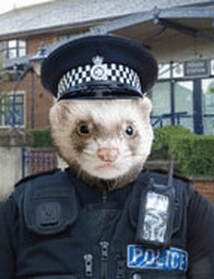recognizing and reporting animal abuse or neglect
|
what is "animal cruelty", "Abuse", or "Neglect"?
Animal abuse (cruelty), or neglect is the infliction of suffering or harm caused to an animal by intentional or unintentional human actions. It includes willful neglect, such as the withholding of food, water or shelter. It often results in the animal’s physical pain or death.
How to RECOGNIZE SIGNS OF animal abuse or neglect
Here are some of the signs that taken together may constitute animal abuse or neglect:
What to do WHEN you suspect animal cruelty, abuse or neglect:
Neglect usually is a result of ignorance on the owner’s part. In some cases, the owner may be “new” to ferret ownership, and the ferret’s needs have not been properly explained or understood by the animal’s caretaker. Providing education and other forms of support to the owner may turn a bad situation around. However, one should check back to see if this approach has been effective.
One of the saddest situations is when a ferret is found (often by the landlord) abandoned and left to die by its owners. Abandonment constitutes neglect and abuse: these folks should be reported. Do not attempt to approach the owner. Report suspected abuse or neglect to the law enforcement, animal control or protection agencies local to the owner or where the ferret was found. Alternatively, a report can be made to a local humane organization, including a ferret shelter-rescue. Report unsanitary conditions (either human or animal) to your local health department. If the household has many animals, one might also explore local zoning laws. However, one must still take care of an animal that is suffering and requires medical intervention. Demand that the situation be investigated. In the case when any of the above agencies are unwilling to proceed with an investigation, or in the face of direct evidence, contact your local or state attorney’s office to intervene. What is needed to proceed with an animal cruelty case?
The simple answer is: Evidence.
who is responsible for prosecuting animal cruelty?
Depending on the locatation where the current owner lives or where the animal was found, it is the city, county, district attorney who is responsible for prosecuting cases of animal cruelty, abuse or neglect.
Neglect is generally an “act of omission rather than commission”: something was NOT done to the animal rather than something that was done. [HSUS] In most cases of “neglect,” authorities typically require the owner to correct the situation. what can ferret shelters or reScues do?
when a juvenile (<18 years old) is involved......
Harmful behavior towards an animal, particularly if the offender is a child or teen, warrants immediate attention. Such cases should be promptly reported to the appropriate authorities. This is because an act of abuse or cruelty towards an animal is a “red flag” that the child offender may him- or herself be experiencing abuse or violence.
Adolescent abuse to animals is a key indicator now recognized by mental health and law enforcement professionals that the person may progress to aggressive behaviors towards humans. This was the case for serial killers Jeffrey Dahmer, and Albert DeSalvo (“the Boston Strangler”), and for the Columbine shooters: each had a history of abuse to animals, before they killed humans. most importantly: don't give up!
Pursue documented cases of animal cruelty, abuse and neglect:
|
external links
|
National District Attorneys Association (NDAA)
Investigating and prosecuting animal cruelty and neglect |




